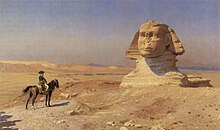In May 1798, Bonaparte was elected a member of the French Academy of Sciences. His Egyptian expedition included a group of 167 scientists: mathematicians, naturalists, chemists and geodesists among them; their discoveries included the Rosetta Stone, and their work was published in the Description de l'Égypte in 1809.
En route to Egypt, Bonaparte reached Malta on 9 June 1798, then controlled by the Knights Hospitaller. The two hundred Knights of French origin did not support the Grand Master, Prussian Ferdinand von Hompesch zu Bolheim, who had succeeded a Frenchman and made it clear they would not fight against their compatriots. Hompesch surrendered after token resistance, and Bonaparte captured a very important naval base with the loss of only three men.

Battle of the Pyramids, François-Louis-Joseph Watteau, 1798–1799
On 1 August, the British fleet under Horatio Nelson captured or destroyed all but two French vessels in the Battle of the Nile, and Bonaparte's goal of a strengthened French position in the Mediterranean was frustrated. His army had succeeded in a temporary increase of French power in Egypt, though it faced repeated uprisings. In early 1799, he moved an army into the Ottoman province of Damascus (Syria and Galilee). Bonaparte led these 13,000 French soldiers in the conquest of the coastal towns of Arish, Gaza and Jaffa, and Haifa. The attack on Jaffa was particularly brutal: Bonaparte, on discovering many of the defenders were former prisoners of war, ostensibly on parole, ordered the garrison and 1,400 prisoners to be executed by bayonet or drowning to save bullets. Men, women and children were robbed and murdered for three days.
With his army weakened by disease—mostly bubonic plague—and poor supplies, Bonaparte was unable to reduce the fortress of Acre and returned to Egypt in May. To speed up the retreat, he ordered plague-stricken men to be poisoned. (However, British eyewitness accounts later showed that most of the men were still alive and had not been poisoned.) His supporters have argued this was necessary given the continued harassment of stragglers by Ottoman forces, and indeed those left behind alive were tortured and beheaded by the Ottomans. Back in Egypt, on 25 July, Bonaparte defeated an Ottoman amphibious invasion at Abukir.

0 comments:
Post a Comment